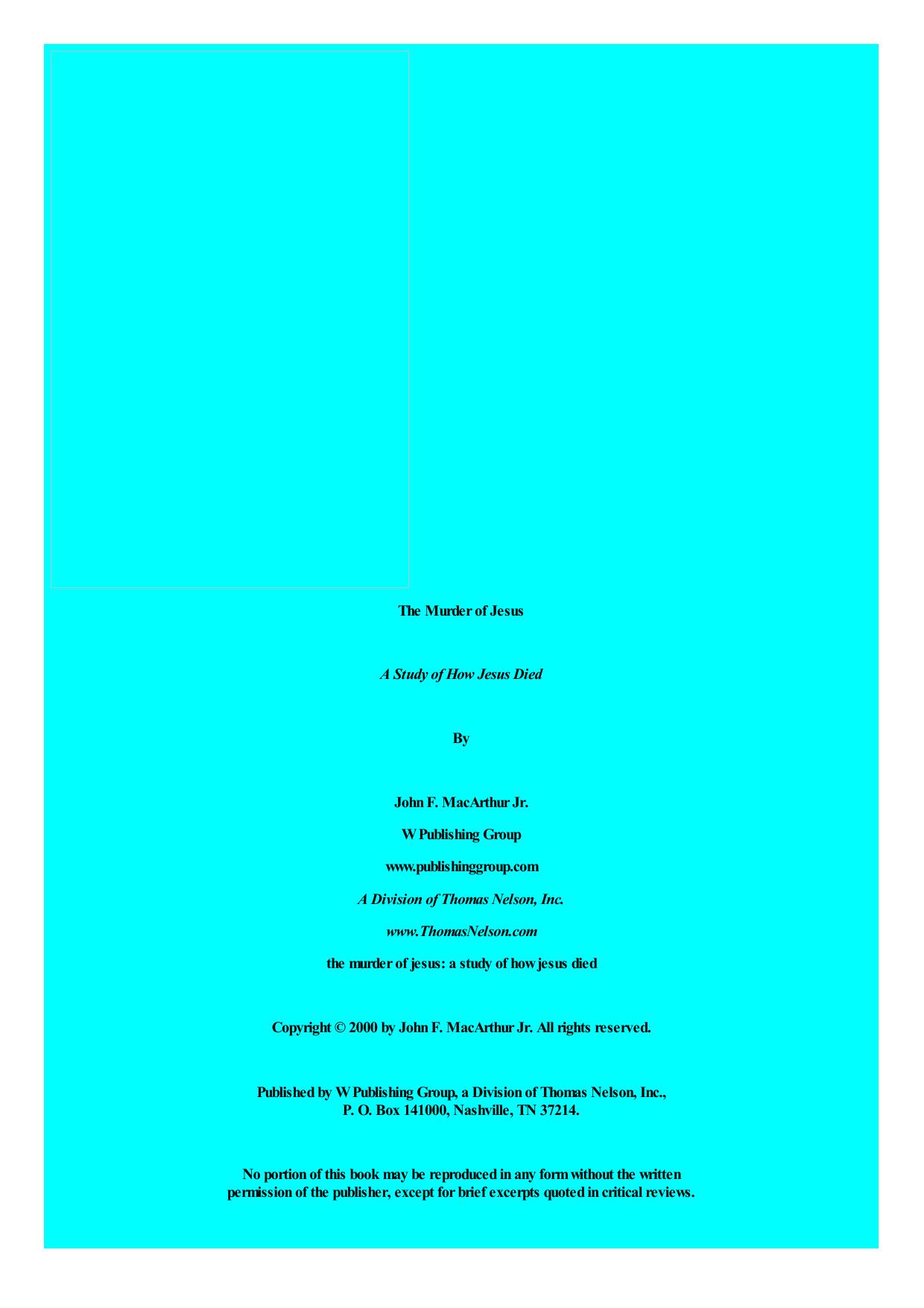Murder of Jesus by John MacArthur

Author:John MacArthur [MacArthur, John]
Language: eng
Format: epub, pdf
Tags: Non-Fiction, History
ISBN: 9780849915543
Google: xzcdnwEACAAJ
Amazon: 0785260188
Barnesnoble: 0785260188
Goodreads: 3337735
Publisher: Thomas Nelson
Published: 2000-03-07T00:00:00+00:00
How did Peter fall? It is important to see that his failure did not occur spontaneously. Peter himself took the wrong steps that put him on the pathway to failure. In order to examine those steps systematically, it is necessary to back up a bit in Matthew’s narrative and review some already familiar ground.
He Boasted Too Loudly
Peter’s first mistake was the boasting self-confidence he showed when Jesus first warned the disciples they were standing on the precipice of serious failure. Back in Matthew 26:31, Jesus told them, “All of you will be made to stumble because of Me this night, for it is written: ‘I will strike the Shepherd, and the sheep of the flock will be scattered.’ ” Christ’s words should have instantly sobered Peter and the others. A wise person would have been humbled—and would have begged the Lord for strength to resist such an imminent temptation.
But not Peter. He bragged, “Even if all are made to stumble because of You, I will never be made to stumble” (v. 33).
Peter, who often acted as spokesman for the whole group, seemed particularly prone to reckless impetuosity. He frequently spoke before he thought. On a few occasions, he was even so brash as to contradict Jesus—like the time in Mark 8:32 when Peter took Jesus aside and rebuked Him for saying He would be rejected by the Jewish leaders and killed. Peter no doubt meant well, but Jesus quickly let him know how far out of line such a rebuke was. He did so by addressing Peter as “Satan” (for Satan was behind Peter’s words), and by reprimanding him for being too concerned about earthly things and not concerned enough for matters pertaining to the heavenly kingdom (v. 33).
Peter should have been listening more closely. If he had simply thought carefully about who Jesus is, he would have seen the folly of “correcting” Him in any context. In fact, it was utterly incongruous to confess (as Peter just had) that Jesus is the Christ, the Son of the Living God (Matthew 16:16), and then moments later turn around and rebuke Him for what He was teaching (v. 22). Unfortunately, Peter did not always seem to sense when he should be listening rather than sounding off.
To make matters worse, Peter (like all of us) sometimes neglected to learn from his own mistakes. Even after Jesus corrected him, he remained slow to hear and quick to speak. You would think with all his bitter experience, he would know by then not to argue with Christ. After all, Jesus had never been wrong about anything. But right up to the night of Jesus’ betrayal—the last night of our Lord’s earthly ministry and the very end of Peter’s three-year discipleship—when Jesus tried to forewarn Peter and the disciples that they were about to stumble, Peter not only argued with Jesus, but he kept pressing the point even after Jesus corrected him. “Jesus said to him, ‘Assuredly, I say to you that this night, before the rooster crows, you will deny Me three times.
Download
This site does not store any files on its server. We only index and link to content provided by other sites. Please contact the content providers to delete copyright contents if any and email us, we'll remove relevant links or contents immediately.
| Exegesis & Hermeneutics | New Testament |
| Old Testament |
The Five People You Meet in Heaven by Mitch Albom(3548)
The Secret Power of Speaking God's Word by Joyce Meyer(3154)
Real Sex by Lauren F. Winner(3001)
Name Book, The: Over 10,000 Names--Their Meanings, Origins, and Spiritual Significance by Astoria Dorothy(2967)
The Holy Spirit by Billy Graham(2938)
0041152001443424520 .pdf by Unknown(2841)
How The Mind Works by Steven Pinker(2811)
ESV Study Bible by Crossway(2772)
Ancient Worlds by Michael Scott(2670)
Churchill by Paul Johnson(2574)
The Meaning of the Library by unknow(2558)
The ESV Study Bible by Crossway Bibles(2544)
The Gnostic Gospels by Pagels Elaine(2516)
MOSES THE EGYPTIAN by Jan Assmann(2410)
Jesus by Paul Johnson(2349)
City of Stairs by Robert Jackson Bennett(2337)
The Complete Dead Sea Scrolls in English (7th Edition) (Penguin Classics) by Geza Vermes(2269)
The Nativity by Geza Vermes(2221)
Ancient Near Eastern Thought and the Old Testament by John H. Walton(2217)
